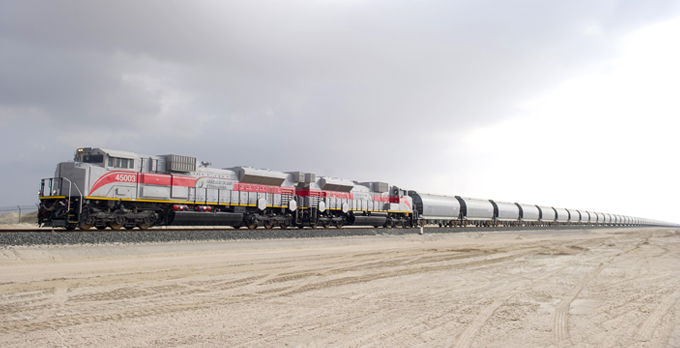Etihad Rail stage 2 financing is approved
The UAE Ministry of Finance and the Abu Dhabi Department of Finance have signed an agreement for the financing of Stage Two of the Etihad Rail national rail network.
Currently, Stage 1 of Etihad Rail, which started commercial operations in 2015, transports granulated sulphur from Shah and Habshan to port of Ruwais over a distance of 264 kilometres.
The second stage will extend 605 km from Ghuweifat on the border with Saudi Arabia to Fujairah on the east coast, to be followed by future route additions. The volume of goods transported will increase from seven million tons per year on Stage One to more than fifty million tons.
Etihad Rail has taken major strides in 2018, most importantly the completion of the preliminary designs of Stage Two of the project in preparation for the launch of tenders for civil construction works by the end of this month.
In 2015, Stage One of the project, which extends 264 km, was delivered, linking the Shah and Habshan gas fields in the Al Dhafra region of Abu Dhabi to the port of Ruwais on the Arabian Gulf, with a capacity of transferring 22,000 tons of sulfur granules daily; 20 million tons have been carried in total.
On the agreement, Sheikh Theyab said: “The budget approval for Stage Two of the UAE’s national railway network reflects the keenness of our leadership to implement national strategic projects.”
“This national project is a qualitative leap and establishes a new transport sector in the UAE. It achieves many benefits and advantages locally and internationally, connecting the emirates and linking industrial areas, boosting economic diversity and supporting economic and social development in the country,” he added.
Sheikh Theyab said: “At Etihad Rail, we are working with a strategy to meet our mission and objectives. This project is part of our commitment to the UAE to help it achieve a leading position in transportation quality, In line with UAE Vision 2021, which aims to transform the emirate’s economy into a competitive knowledge economy by transitioning to a knowledge-based economy, promoting innovation and research and development, strengthening the regulatory framework for key sectors, and encouraging high value-adding sectors.”






















 Kuwaiti developer URC signs with Ahmadiah Contracting for the Commercial District development at Hessah AlMubarak
Kuwaiti developer URC signs with Ahmadiah Contracting for the Commercial District development at Hessah AlMubarak